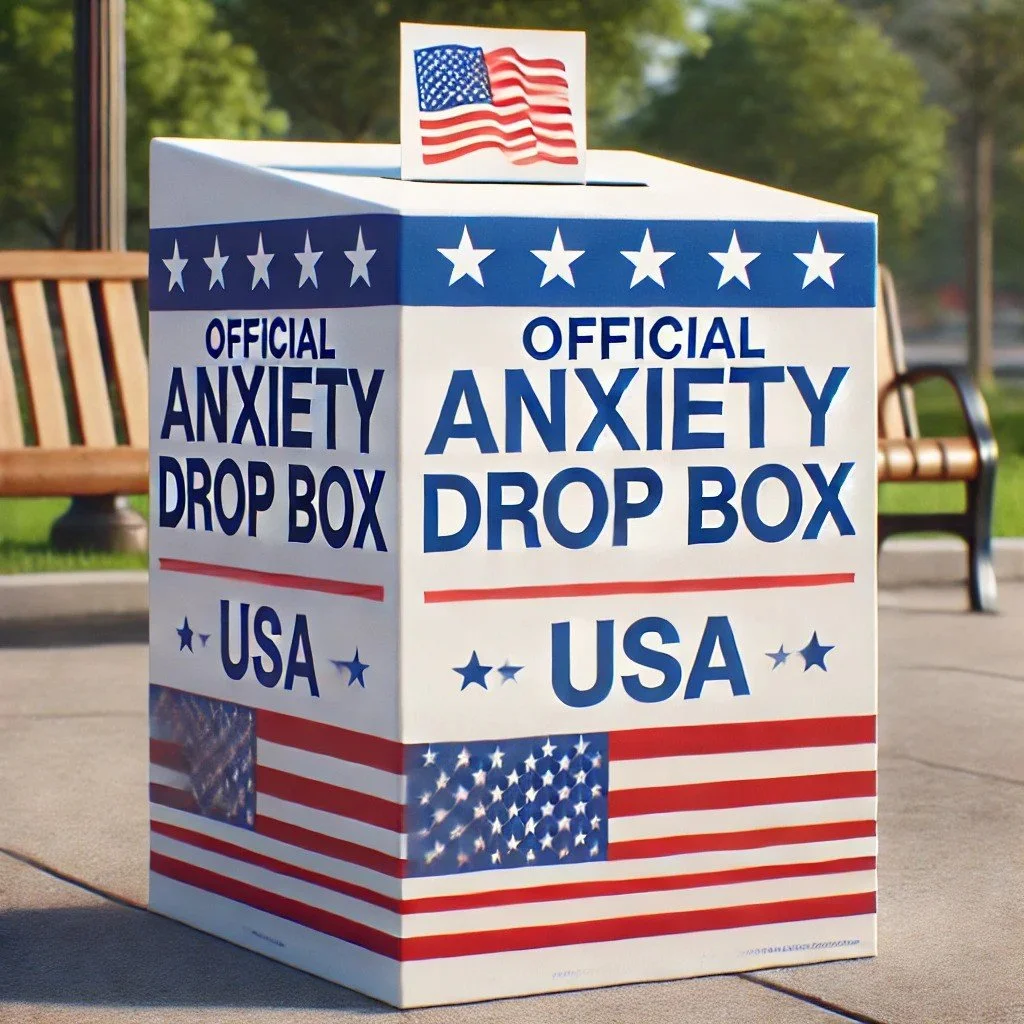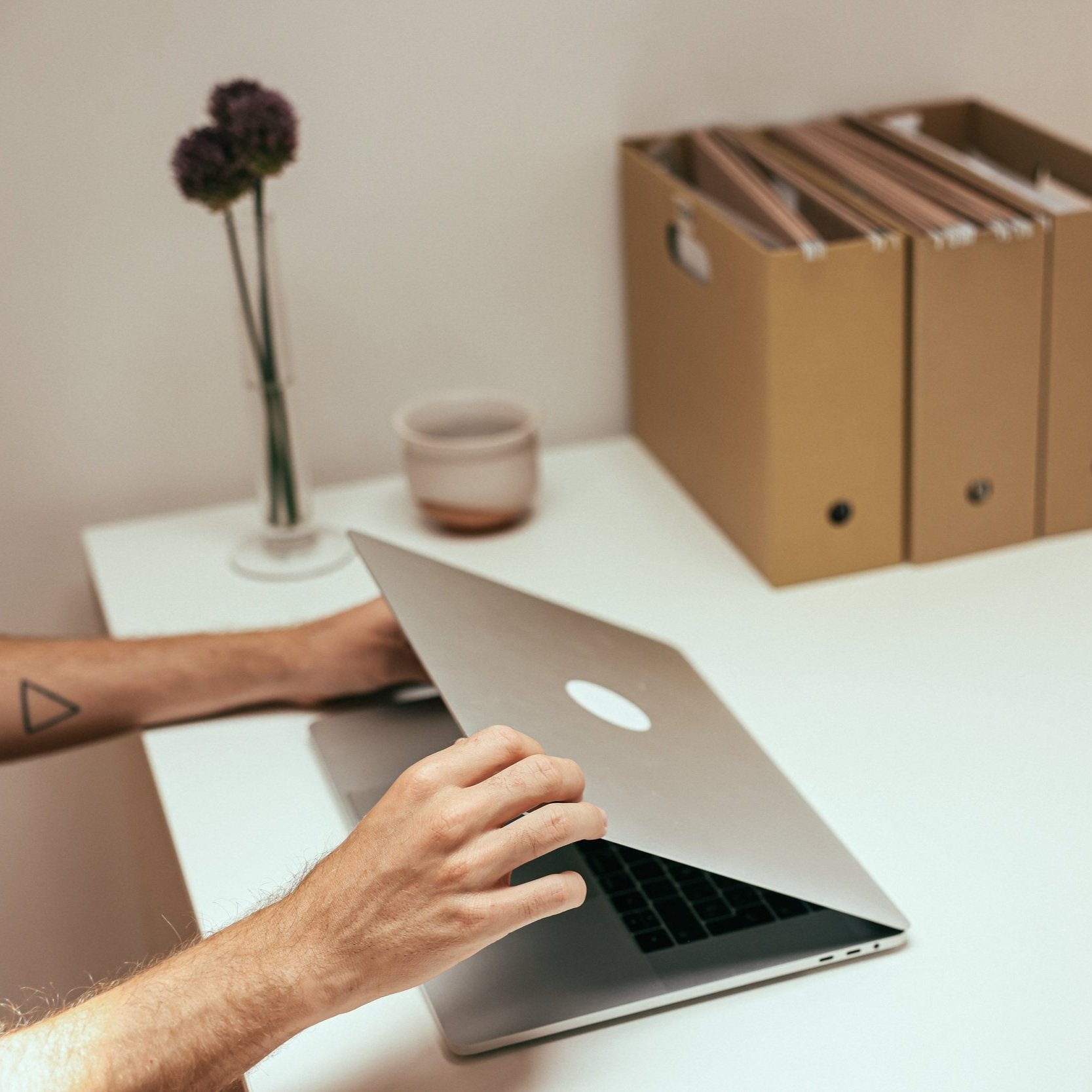Managing Election Anxiety: Strategies for Staying Grounded
If you're feeling on edge about the upcoming election, you're in good company. Elections can be a significant source of anxiety, especially when the stakes feel high. If you’re feeling overwhelmed by the political climate and the uncertainty surrounding election outcomes, welcome. It's important to find ways to manage this anxiety, stay present, and maintain your mental health. But we know it's also important not to disconnect and give up. Here are practical tips to help you navigate election season with a balanced approach.
Why Elections Create So Much Anxiety
Elections are pivotal events that significantly impact our lives and the broader society. The anxiety they induce stems from several factors, all rooted in uncertainty and the high stakes involved.
Uncertainty and Lack of Control. Elections bring about uncertainty regarding the future direction of the country or community. This uncertainty can be unsettling because the outcome is beyond individual control. People often feel anxious when they don’t know what to expect or how it will affect their lives.
High Stakes and Consequences. The results of an election can lead to substantial changes in policies, leadership, and governance. These changes can affect everything from healthcare to education to personal freedoms. The high stakes mean that many people feel a deep personal investment in the outcome, heightening their anxiety.
Media Saturation. The intense media coverage surrounding elections contributes significantly to anxiety. Constant news updates, opinion pieces, and social media discussions create continuous information flow, which can be overwhelming. The sensationalist nature of media can amplify fears and uncertainties.
Polarization and Conflict. Elections often highlight divisions within society. The intense polarization between different political groups can lead to increased stress and anxiety. The fear of societal division and the potential for conflict can weigh heavily on individuals.
Personal Identity and Values. Political preferences are often closely tied to personal identity and core values. An election outcome that opposes one’s beliefs can feel like a personal rejection, leading to anxiety about the future of those values and principles.
Misinformation and Fearmongering. The spread of misinformation and fearmongering tactics during election campaigns can exacerbate anxiety. False or exaggerated claims about candidates or policies can create unnecessary fear and panic.
Managing election anxiety involves recognizing these sources of stress and finding ways to stay grounded. Limiting media consumption, practicing mindfulness, engaging in self-care, and focusing on constructive activism can help.
Election Anxiety Management Strategies
Schedule and Contain Your Election Anxiety
Why It Matters: Setting aside specific time to acknowledge and then set aside your worries can help you manage anxiety more effectively.
How to Do It:
Scheduled Worry Time to Contain and Release: Designate a specific time of day to write down all your election-related worries. Set a timer for 10-15 minutes and scribble down everything that’s on your mind. When the timer goes off, stop writing and put the list somewhere safe. Don’t look at it again. Move on to an activity that is active or calming, like exercise, reading, or a favorite sitcom. This practice can help contain your anxiety, allowing it to move through you without overwhelming your day.
2. Stay in the Present Moment More Often
Why It Matters: Anxiety stems from worrying about future events that are beyond our control. Staying present helps reduce this stress and keeps you grounded.
We know it's hard not to live too much in the future. After all, it shows you care! We all want a better world, healthier planet, and secure future for the next generation. But living entirely in the future robs you of the richness of the present moment.
How to Do It:
Mindfulness Practices: Engage in mindfulness exercises such as deep breathing, meditation, or yoga. These practices can help you stay focused on the here and now.
Limit Speculative Thinking: Avoid getting caught up in "what if" scenarios that lead to catastrophizing. Focus on what you can control in the present moment.
3. Moderate Social Media Use
Why It Matters: The algorithm has a profound impact on our mental health. Social media can amplify anxiety by exposing you to constant updates, heated discussions, and misinformation. It's not an accurate or helpful source of information. In fact, studies have shown that social media is the least reliable AND most emotionally damaging way to engage with politics. Moderating your use can help maintain your mental equilibrium.
How to Do It:
Set Boundaries: Limit your time on social media platforms. Set specific times of day for checking updates and stick to them. We recommend using an app like OffScreen or One Sec to help moderate your use.
Do a Social Media Detox. Delete the apps for a week or two. If you absolutely have to access it for work, allow yourself a limited amount of time on your desktop. You might consider installing hardcore blocking programs like SelfControl on your computer to truly block or limit time on social.
Curate Your Feed: Follow accounts that provide balanced perspectives and avoid those that contribute to your anxiety. Consider muting or unfollowing accounts that are particularly stressful. When the algorithm suggests triggering content, instruct it to suggest less.
4. Balance Self-Care with Activism
Why It Matters: While staying informed and engaged is important, it's equally crucial to take care of your mental health. Balancing self-care with activism helps sustain your well-being.
How to Do It:
Remind Yourself That Vicarious Trauma Is Not Activism. Activism can take many forms and effort levels. We've got a list of ideas for trauma-free activism here.
Create a Self-Care Routine. Incorporate activities that relax and rejuvenate you into your daily routine. This could be exercise, reading, hobbies, or spending time with loved ones.
Set Realistic Activism Goals. Choose a few ways to get involved that feel manageable. This could include volunteering, making calls, or attending peaceful protests. Ensure that your activism efforts do not overwhelm your capacity for self-care.
5. Manage Your Personal Interactions
Why It Matters: Spending time with people who are anxious or negative about the election can increase your own anxiety. Managing these interactions can help protect your mental health.
How to Do It:
Set Boundaries: Politely but firmly set boundaries with friends or family who may contribute to your stress. It's okay to limit conversations about politics if they become too overwhelming. We’ve got a LOT to say about setting and reinforcing boundaries on our blog.
Seek Supportive Communities: Surround yourself with people who understand and support your need for balance. Join groups or communities that focus on positive engagement and mutual support.
6. Practice Gratitude
Why It Matters: Focusing on what you’re grateful for can shift your mindset from worry to appreciation.
How to Do It:
Keep a Gratitude Journal: Dedicate a notebook to your gratitude practice. Each day, write down three things you’re thankful for. They can be as simple as a good cup of coffee or as significant as a supportive friend. Reflecting on these positives can uplift your mood and provide a more balanced perspective.
Share Your Gratitude: Take a moment to express your appreciation to others. Send a thank-you note, text, or email to someone who has made a positive impact on your day. Sharing gratitude not only benefits you but also strengthens your relationships.
Gratitude Rituals: Incorporate gratitude into your daily routines. For example, during meals, take a moment to acknowledge something you’re thankful for. This can help reinforce a positive outlook throughout the day. It's great to do with partners, kids, and housemates.
7. Engage in Grounding Activities
Why It Matters: Grounding activities can help anchor you in the present moment, reducing anxiety.
How to Do It:
Gardening: Connect with nature by tending to plants. Gardening requires focus and attention, which can distract you from anxious thoughts. The act of nurturing a plant from seed to bloom can be incredibly satisfying and grounding.
Cooking: Preparing a meal involves multiple senses—sight, smell, touch, and taste. Engaging in the process of cooking can draw you into the present moment. Follow a new recipe or make a favorite dish to fully immerse yourself in the activity.
Walking in Nature: Spend time outdoors in a park, forest, or even your neighborhood. Pay attention to the sights, sounds, and smells around you. Walking in nature can be calming and helps ground you in the present. Try to observe the small details, like the rustle of leaves or the chirping of birds.
8. Use Relaxation Techniques
Why It Matters: Techniques like progressive muscle relaxation or guided imagery can help calm your mind and body.
How to Do It:
Progressive Muscle Relaxation (PMR): Find a quiet space and sit or lie down comfortably. Starting from your toes, tense each muscle group for a few seconds and then slowly release. Move up through your body, tensing and relaxing each group. This practice helps reduce physical tension and promotes relaxation. We’ve got a great recording of one of our therapists guiding you through this exercise.
Guided Imagery: Close your eyes and imagine a peaceful scene, such as a beach, forest, or any place where you feel calm. Use all your senses to create a vivid mental image. Listen to guided imagery recordings if you need help visualizing. This technique can transport your mind away from anxiety-inducing thoughts.
Deep Breathing Exercises: Practice deep breathing to help calm your nervous system. Inhale slowly through your nose, hold for a few seconds, and then exhale through your mouth. Repeat this cycle several times. Deep breathing can reduce stress and bring your focus back to the present moment.
Common Questions About Election Anxiety
Q: How can I stop myself from constantly worrying about the election?
A: Focus on the present moment and engage in activities that distract and relax you, like the ones above. Practices that bring into the present moment can also be most helpful in redirecting your thoughts.
Q: What if my anxiety is really affecting my daily life?
A: If election anxiety is interfering with your daily functioning, it may be beneficial to seek support from a therapist.
Q: How can I balance staying informed with not getting overwhelmed?
A: Set specific times to check the news and stick to them. Choose reliable sources like print media and avoid constant updates.
Q: What self-care activities are most effective for reducing anxiety?
A: Activities that you enjoy and that help you relax are the most effective. This doesn’t always mean things that are fun. Exercise is one of the most effective ways to treat anxiety, and not everyone finds it fun. This could also include hobbies, spending time with loved ones, or practicing mindfulness.
Q: How can therapy help with election anxiety?
A: Therapy provides a space to explore and manage your anxiety. A therapist can offer strategies to cope with stress and maintain your mental health during challenging times.
Take Care of Your Mental Health Today
We understand the challenges of election anxiety. Our therapists are here to support you in developing strategies to manage stress, stay present, and maintain your mental well-being. We offer personalized, holistic support to help you navigate these uncertain times.
Schedule a free consultation today and discover how our teletherapy services in California & Florida can help you achieve balance during election season and beyond.















